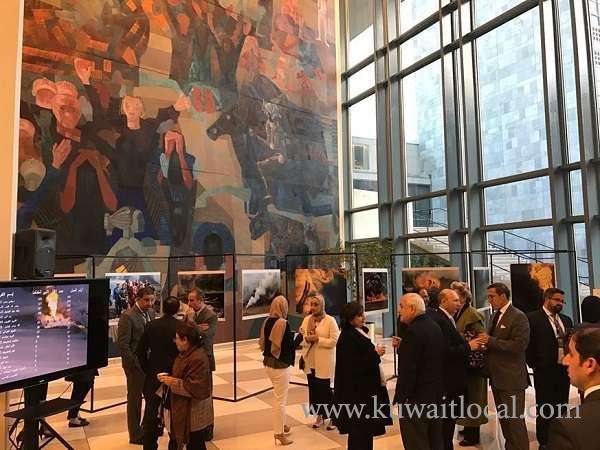Latest News
- Kuwait-Jordan Durra Field Joint Statement Rejected By Iran
- GTD Cracks Down On Vehicle Noise Pollution In Sulaibiya
- Mystery Of Dead Fish At Shuwaikh Beach Sparks Urgent Action
- MEW To Complete Links With The Interior And Justice Ministries B...
- 8 Expats Jailed For Bribing An Officer To Obtain Driver's Licens...
- Weekend Weather Is Expected To Be Hot
- From Tomorrow, Traffic Diversion On Third Ring Road
- Ministry Of Health Refute Rumors On Non-availability Of Antibiot...
- Amir Of Kuwait And Jordan King Renew Commitment To Regional Secu...
- 37 Arrested With Narcotics And Firearms
- Outrage Over Candidate's Arrest
- Six Stores Shut Down In Jahra For Selling Fake Goods
Kuwait Holds Exhibit On International Day For Preventing Exploitation Of Environment In War, Armed Conflict

Kuwait Mission to the UN held a photo exhibition in recognition of the International Day for Preventing the Exploitation of the Environment in War and Armed Conflict, commemorated each year on November 6th at the UN.
The photo exhibition that was held at the UN Headquarters, was attended by the President of the 71st General Assembly Peter Thomson and Assistant Secretary General and Head of the UN Environment Program Office in New York Elliott Harris.
In February 1991, the retreating Iraqi army set more than 700 oil wells on fire, and the extensive damage to Kuwait's oil fields have impaired the ecosystem and natural resources of Kuwait well beyond the period of conflict.
Kuwait's Permanent Representative Ambassador Mansour Ayyad Al-Otaibi said in his opening speech that this day is of significance to Kuwait due to the grave environmental impact endured as a result of the oil wells that were set on fire in 1991, resulting in the formation of an international alliance of non-military mobilization to put out these massive fires.
He hoped that the exhibition brings to light the consequences that the exploitation of the environment during armed conflict can dangerously cause. "May this serve as a reminder that we can never take back the damage to the environment that these destructions seriously trigger," he told the attendees.
During conflicts today, Al-Otaibi said the world continues to see attacks on infrastructure that result in the pollution of water resources, the destruction of crops, the poisoning of the soil and air, and the slaughtering of animals - all for military advantage.
The images displayed depict the severity of the destruction the fires caused, and the serious environmental effects on the aftermath. The Kuwaiti official confirmed that to put out some of the oil fires showcased in the photos, the cost was between USD 1.5 - USD 2.2 Billions.
In 1993, the UN General Assembly passed a resolution in the 2nd committee on this issue, being deeply concerned about the nature and extent of the environmental damage suffered by Kuwait.
"This resolution stated the adverse effects on the well-being of Kuwaiti people as well as the overwhelming impact on the livestock, agriculture, fishing, and wildlife in Kuwait," Al-Otaibi added.
Estimates showed that Kuwait lost three percent of its oil reserves because of the fires, due to the fact that between four and six million barrels of oil were burning daily.
In total, Kuwait lost 600 million barrels of oil, valued at USD 12 Billion, or the equivalent to three months of global consumption in 1991. The efforts to eliminate the fires required the help of 15 companies from 9 countries, and a total of 10,000 workers from over 30 countries, taking 8 months - from March to November of 1991, to extinguish all the flames.
Trending News
-
 Kuwait Implements Home Biometrics Services Ahead O...
14 April 2024
Kuwait Implements Home Biometrics Services Ahead O...
14 April 2024 -
 Kuwait Airways Provides Update On Flight Schedule...
14 April 2024
Kuwait Airways Provides Update On Flight Schedule...
14 April 2024 -
 Kuwait Airways Introduces Convenient Home Luggage...
15 April 2024
Kuwait Airways Introduces Convenient Home Luggage...
15 April 2024 -
 Expat Residency Law Amended By Kuwait Ministerial...
20 April 2024
Expat Residency Law Amended By Kuwait Ministerial...
20 April 2024 -
 Two Expats Are Arrested For Stealing From Salmiya...
17 April 2024
Two Expats Are Arrested For Stealing From Salmiya...
17 April 2024 -
 An Egyptian Expat Dies At Kuwait's Airport
11 April 2024
An Egyptian Expat Dies At Kuwait's Airport
11 April 2024 -
 Kuwait Airways Resumes Flights To Beirut And Oman...
15 April 2024
Kuwait Airways Resumes Flights To Beirut And Oman...
15 April 2024 -
 Bay Zero Water Park Kuwait: Summer Season Opens Ei...
11 April 2024
Bay Zero Water Park Kuwait: Summer Season Opens Ei...
11 April 2024 -
 Temperature Increases Cause Electricity Load Index...
21 April 2024
Temperature Increases Cause Electricity Load Index...
21 April 2024 -
 Thief Returns Stolen Money With An Apology Letter...
15 April 2024
Thief Returns Stolen Money With An Apology Letter...
15 April 2024












Comments Post Comment